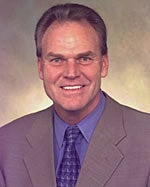Sleep center expands to serve more adults, children

Dr. Ronald Perkin
GREENVILLE, N.C. — East Carolina University’s Sleep Disorders Center has expanded to help speed a restful night to weary adults and children.
The center has expanded to six beds, including a special room for children with sleep disorders. Dr. Ronald Perkin, chair and professor of pediatrics at the Brody School of Medicine, began seeing children with sleep problems at the center this month.
Approximately 25 percent of children overall experience some type of sleep problem, ranging from difficulty falling asleep and waking up at night to more serious primary sleep disorders, such as sleep apnea or narcolepsy, Perkin said. More than one-third of elementary school-aged children and 40 percent of adolescents have significant sleep complaints.
“Although many sleep problems in infants and children are transient and self-limited, the common wisdom that children grow out of sleep problems is not an accurate perception,” Perkin said, adding that other factors can lead to chronic sleep problems.
Among those factors is attention deficit hyperactivity disorder. Up to a quarter of children with ADHD have evidence of sleep-disordered breathing, and up to half of them have evidence of restless leg syndrome or periodic limb movements, Perkin said. “Treatment of these sleep problems may improve the symptoms in children with ADHD,” he said. “Similarly, sleep disorders will add to the severity of ADHD symptoms when they co-exist.”
Perkin said some children diagnosed with ADHD actually have a sleep disorder that accounts for their symptoms. The symptoms of sleep deprivation — inattentiveness and inability to focus — are very similar to those of ADHD, he said.
Another factor that could exacerbate sleep problems is obesity. Thirty-seven percent of U.S. children between the ages of 6 and 11 years are overweight or obese, according to the Centers for Disease Control and Prevention. Perkin said overweight and obesity can lead to sleep problems, particularly breathing disorders, and sleep problems and the resulting tiredness can lead to children gaining more weight.
Dr. Sunil Sharma, medical director at the ECU center and a board-certified sleep specialist, said children also deprive themselves of sleep. One device he uses with children is similar to a wristwatch that also indicates when children actually go to sleep. That helps parents know if children are staying up in their rooms communicating with friends or playing video games.
Sharma said Americans as a whole are sleep deprived. When doctors work with children to improve their sleep, it can help the rest of the family, too.
“I’ve seen a lot of parents change their habits to become good role models for their children,” Sharma said. “Both parents and kids gain from it.”
For more information about the ECU Sleep Disorders Center or to schedule an app